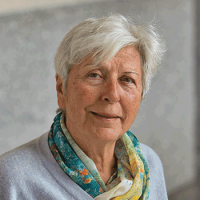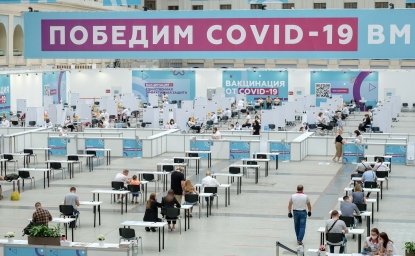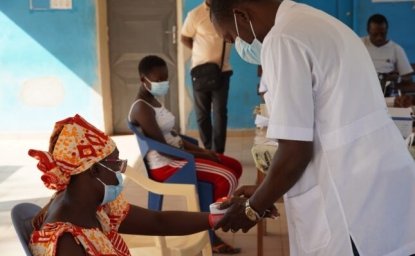The Unique Challenges of Combating the Pandemic in Latin America
Latin America Program Director Cynthia Arnson
"Even before the coronavirus outbreak, the UN’s Economic Commission on Latin America and the Caribbean had forecast that growth from 2014 to 2020 would be the lowest in seven decades--even after excluding Venezuela’s catastrophic collapse. Now, oil and commodity prices have collapsed, the tourism industry is essentially shuttered--all things that Latin American and Caribbean countries depend on. The pain will be deep as a global recession gathers steam, hurting the all-important export sectors that are critical to the region's economic health."
"It is hard not to be apocalyptic when thinking about the effects of a potential widespread outbreak in Venezuela. The health system was itself on life support long before the pandemic started. Hospitals not only lack medicine and equipment, but also the most basic sanitation capabilities like running water. People in poor neighborhoods--where food scarcity, power outages, and drinking water shortages have been the norm--have no chance of observing basic preventive measures like washing your hands."
"Also at grave risk are Venezuelan refugees, some 5 million of whom have fled Venezuela's collapsing economy and political persecution. Colombia is at the epicenter of this human tragedy, with some 1.6 million refugees who have entered over the last five years. To limit the possibilities for contagion, Colombia has closed its land border with Venezuela, but hundreds if not thousands of informal crossing points remain. Without the capacity for widespread testing, with unsanitary living conditions for hundreds of thousands of refugees, and with a public health system already stretched to the limits, Colombia, too, faces an overwhelming challenge of limiting and responding to a coronavirus outbreak."
Europe’s Distinctive Approaches to Containing COVID-19
Wilson Center Public Policy Scholar Diana Villiers Negroponte
Astonishing the distinct approaches taken by the UK, French and German governments to containing, testing and caring for those infected with COVID-19.
The best organized is the German government. After diagnosing the virus among skiers returning from Italy and Austria in January, Chancellor Angela Merkel encouraged independent laboratories to develop tests for COVID-19. Early testing plus the assurance that 25,000 critical care beds with respirators were available ensured the German public that contracting the virus was not a death knell. Of the 10,999 cases diagnosed on March 19, only 20 people have died from COVID-19, representing 3.1 for every 1,000 infected. As a result, Germans have greater equanimity in confronting and containing the virus. The British government took a contrary approach with a wait and see the policy.
PM Boris Johnson waited until March 16 before closing pubs and clubs. The degree of social spacing neither extends to schools nor to transportation. Instead, he asked scientists to produce an antibody test to measure an individual's resistance to the virus. Tests to determine the existence of COVID-19 are only offered to symptomatic patients inside the National Health System (NHS) hospitals. When deaths from the virus jumped from 55 last Monday to 144 on Thursday, representing a mortality rate of 44.05 per 1,000 infected, Johnson added restaurants to his list and promised to develop a COVID-19 test akin to pregnancy tests, only this time blood would be drawn not urine.
President Macron of France has imposed fines on those breaking his order than no one leave their homes, except for runs to the grocery, pharmacy, paper kiosk and banks. This order came after Parisiens ignored last week’s call for social spacing and enjoyed weekend strolls through Paris, enjoying a Pernod at the local cafe. In the face of 6,012 positive cases for COVID-19, the mortality rate jumped from 127 to 264 in 3 days representing 28.9 per 1,000 infected. None of these numbers compare to the 82.9 per 1,000 infected in Italy, but the distinct paths of European governments demonstrate who understands the nature of this pandemic and who is ready to take draconian measures to protect their citizens.
Dealing with the Reality of COVID-19
Wilson Center Scholar Dr. Lawrence Altman
"As COVID-19 forces us to hunker down in our homes, telecommute, stock up on staples, limit visits to relatives and friends, and disrupt our lives in many other ways, we are paying a steep price for not heeding the advice of health officials who, for decades, repeatedly urged government officials to prepare for another pandemic resembling the one from influenza that killed 20 to 100 million people from 1917-1920. Millions more like President Woodrow Wilson, for whom our institution is named, were sickened but recovered in that pandemic. Lack of adequate monetary investment in public health institutions and political will to support them has resulted in the lack of state and federal governments being ill-prepared for confronting the COVID-19 pandemic. We face monumental challenges of caring for COVID-19 patients and preventing further expansion of the novel virus. Because Nature is hiding many more infectious agents, some likely to emerge in the coming years, it is imperative to financially and politically support public health institutions to avert the next pandemic."
Canada and US Agree to Restrict Border Crossings
Canada Institute Director Christopher Sands
"The most significant aspect of the decision to restrict crossings at the US-Canadian border is that it was mutual, with both Washington and Ottawa taking coordinated action that allows for essential shipments and individuals to cross. That was not the approach taken by the United States with China nor Europe, and it is the fruit of nearly two decades of efforts by the United States and Canada after the September 11 attacks to adopt a shared border management approach that is data-driven utilizing risk management to allocate personnel and technology to keep the border open to legitimate trade and travelers in an emergency.”
China to Expel US Reporters
Director of the Kissinger Institute Robert Daly
"In its broad contours, the Chinese Ministry of Foreign Affairs’ announcement was expected and, from the Chinese Communist Party’s viewpoint, proportionate. But the statement is either blinkered or bullying in its refusal to acknowledge that Xi Jinping himself, in declaring that 中国媒体都性党 (“Chinese media are all surnamed ‘Party’”), announced that Chinese journalists are not journalists in the same sense as those who work for free commercial media organs outside of China. The work of Chinese media directed by the Publicity Department of the Communist Party of China, which, until recently, was known as the Ministry of Propaganda. Chinese media’s job is to “tell China’s story to the world” in ways that support the CCP’s master narrative.
This is not to imply that the men and women who work for Chinese Party media are incapable of performing as journalists. Many are first-rate reporters and analysts, but they can show their mettle only when covering issues not deemed sensitive by the Party. Those who operate outside of Party strictures risk severe punishment. Chen Qiushi, who posted video blogs from Wuhan during the height of its coronavirus crisis, was “quarantined” and hasn’t been heard from in over a month.
China’s decision to kick American journalists out of the PRC is the latest evidence of a broader trend. China and the United States—China and much of the free, developed world—have begun decoupling not only their integrated supply chains and financial systems but their integrated information and knowledge systems as well. Our media, higher educational institutions, think tanks, and creative classes are gradually becoming estranged from and hostile to each other.
What does this alienation portend? It’s an imperfect analogy, but think of how Fox News and MSNBC depict disparate realities for separate audiences and the costs those disconnects have for the United States. We don’t need our imaginations to know how this plays out on a global scale. It’s happening now. Chinese and American leaders are wasting time and energy on a futile, infantile coronavirus blame game—arguing over where the pathogen originated and what to call it—rather than marshaling their resources and expertise to find common solutions to the crisis. We can expect more of the same in relation to other transnational issues—combatting climate change, regulating emergent technologies ethically and effectively, arms control."
The Latest from the Far East
Asia Program Director Abraham Denmark
"The recent back-and-forth of accusations and name-calling between Chinese and American leaders is counter-productive and distracts from the cooperation we need to fight this virus together. This virus should be an opening for enhanced cooperation with Beijing, and the United States should be able to get the help we need from China while remaining true to our democratic values.
Taiwan's Defence Ministry said late on Monday that Chinese J-11 fighters and KJ-500 airborne early warning and control aircraft flew into the waters southwest of Taiwan for night-time exercises (this could also be in response to reports that DoD is reducing exercises as a reaction to coronavirus): the world will not just pause and wait for the United States to sort itself out. There are tens of thousands of US men and women in uniform deployed around the world, and they now must continue to fulfill their normal missions while also reacting and adjusting to the threat posed by this pandemic. US Forces in Korea, for example, has done a terrific job of maintaining deterrence against North Korea while at the same time responding on the front-lines of the coronavirus outbreak while living and working in South Korea."
Russia and Euraisa Respond to the Pandemic
Kennan Institute Program Assistant Morgan Jacobs
“The response to the coronavirus in the post-Soviet region remains fluid.
Russia has now adopted measures similar to many other nations across the globe to combat the spread of the coronavirus. The cabinet is also set to unveil a stimulus package to offset the expected economic hit the country will take. While Moscow has recorded a low number of cases thus far, rates of infection continue to increase at a rapid clip and an overflow hospital is currently being built in the city’s outskirts to handle the expected influx of patients.
While Ukraine has few confirmed cases of the virus compared to the rest of Europe, Kyiv has taken a preventative approach toward containment. The government has imposed what amounts to a lockdown on the entire country. All public spaces will be shuttered and many modes of domestic and public transportation between cities will be stopped. Kyiv is also working on a litany of measures to combat the expected economic fallout.
Some Central Asian nations have also begun to report cases of the virus. Kazakhstan, Kyrgyzstan, and Uzbekistan have implemented emergency measures including school closures, barring foreigners from entry, and canceling events. Meanwhile, Turkmenistan and Tajikistan have confirmed no cases of the virus thus far and have taken extremely limited measures.”
COVID-19 in Mexico
Mexico Institute Director Duncan Wood
"The Mexican government’s response to the COVID-19 pandemic highlights the problems that exist in Mexico between a president who is resistant to the advice of experts and a government bureaucracy that continues to try to improve conditions within the country. President Lopez Obrador perhaps wants to downplay the severity of the crisis because he fears that widespread anxiety or panic will further damage the country’s economic performance. Social distancing in Mexico will prove to be complicated because Mexico’s is a highly tactile culture. more worryingly the Mexican public health system appears to be poorly prepared for the outbreak of this pandemic. We have already seen shortages of medicine and basic supplies at Mexican hospitals and problems in the government procurement process for medication."
Digital Privacy in the Time of COVID-19
Wilson Center Scholar Stuart Brotman
"As much of the nation switches from office-based activities to remote work, it’s unclear how well we are prepared for such a seismic shift. Several potential problems come quickly to mind. Many company networks, particularly those supporting small and medium-sized businesses, are not protected from system contamination—viruses of a different kind that may be spread to company employees working at home(and vice versa).
The private devices these employees are using also may be unprotected, leaving open greater opportunities for foreign and domestic hackers to create digital disruption at an unprecedented scale, including fake news alerts that induce greater public panic. Finally, increased social isolation among new mandatory home-based workers will mean that more sensitive personal information beyond the business context will be sent to family and friends so that a feeling of daily normalcy can be maintained."
COVID-19 in Syria and Egypt
Wilson Center Scholar Amy Austin Holmes
"Northeast Syria, the area under SDF control where US troops are still located, does not have a single testing machine for the Coronavirus. There was one testing facility in Serekaniye, but it was put out of operation when Turkey intervened and occupied the area in October after Trump's phone call with Erdogan.
In Egypt, the over-crowded prisons are a potential breeding ground for the virus. Many people are in prison simply for Facebook posts or journalistic reporting, such as former Wilson Center fellow Ismail Alexandrani."
COVID-19 in the Shia Crescent
Middle East Fellow Marina Ottaway
"The Shia crescent (Iran, Iraq, Syria, and Lebanon) is turning into a crescent of contagion. All countries in the arc are seriously weakened by political and economic crises and have been slow to react. The virus is spreading rapidly. The situation will turn particularly dramatic in Syria, where a large number of refugees from the fighting in Idlib are living in the open, without assistance. People weakened by hunger and lack of shelter in freezing temperature will have little resistance to COVID-19."
Authors








Howard Distinguished Endowed Professor of Media Management and Law and Beaman Professor of Journalism and Electronic Media, University of Tennessee, Knoxville

Research Professor of International Affairs and Acting Director of the Foreign Area Officers Program, George Washington University

Former Senior Research Associate and Head of the Middle East Program, Carnegie Endowment for International Peace

Medical Writer and 'The Doctor's World' Columnist, New York Times; Clinical Professor of Medicine, New York University

Kissinger Institute on China and the United States
The Kissinger Institute works to ensure that China policy serves American long-term interests and is founded in understanding of historical and cultural factors in bilateral relations and in accurate assessment of the aspirations of China’s government and people. Read more


Canada Institute
The mission of the Wilson Center's Canada Institute is to raise the level of knowledge of Canada in the United States, particularly within the Washington, DC policy community. Research projects, initiatives, podcasts, and publications cover contemporary Canada, US-Canadian relations, North American political economy, and Canada's global role as it intersects with US national interests. Read more


Indo-Pacific Program
The Indo-Pacific Program promotes policy debate and intellectual discussions on US interests in the Asia-Pacific as well as political, economic, security, and social issues relating to the world’s most populous and economically dynamic region. Read more


Kennan Institute
The Kennan Institute is the premier US center for advanced research on Eurasia and the oldest and largest regional program at the Woodrow Wilson International Center for Scholars. The Kennan Institute is committed to improving American understanding of Russia, Ukraine, Central Asia, the South Caucasus, and the surrounding region through research and exchange. Read more


Mexico Institute
The Mexico Institute seeks to improve understanding, communication, and cooperation between Mexico and the United States by promoting original research, encouraging public discussion, and proposing policy options for enhancing the bilateral relationship. A binational Advisory Board, chaired by Luis Téllez and Earl Anthony Wayne, oversees the work of the Mexico Institute. Read more


Science and Technology Innovation Program
The Science and Technology Innovation Program (STIP) serves as the bridge between technologists, policymakers, industry, and global stakeholders. Read more


Middle East Program
The Wilson Center’s Middle East Program serves as a crucial resource for the policymaking community and beyond, providing analyses and research that helps inform US foreign policymaking, stimulates public debate, and expands knowledge about issues in the wider Middle East and North Africa (MENA) region. Read more


Latin America Program
The Wilson Center’s prestigious Latin America Program provides non-partisan expertise to a broad community of decision makers in the United States and Latin America on critical policy issues facing the Hemisphere. The Program provides insightful and actionable research for policymakers, private sector leaders, journalists, and public intellectuals in the United States and Latin America. To bridge the gap between scholarship and policy action, it fosters new inquiry, sponsors high-level public and private meetings among multiple stakeholders, and explores policy options to improve outcomes for citizens throughout the Americas. Drawing on the Wilson Center’s strength as the nation’s key non-partisan policy forum, the Program serves as a trusted source of analysis and a vital point of contact between the worlds of scholarship and action. Read more

Explore More
Browse Insights & Analysis
Russia’s Security Approach to Public Health

WIPO is AWOL

